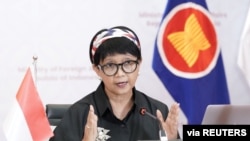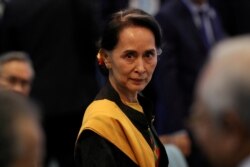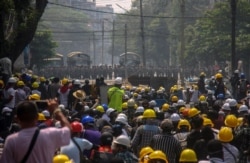Members of the Association of Southeast Asian Nations (ASEAN) pushed for the release of Myanmar’s de facto leader Aung San Suu Kyi and a return to democracy after meeting Tuesday on the state of the country.
"Restoring democracy back on track must be pursued," Retno Marsudi, Indonesia’s foreign minister, said. The comments follow Myanmar’s February 1 military coup in which de facto leader Aung San Suu Kyi and other members of Myanmar's civilian government were removed from office and detained.
Foreign ministers representing each of ASEAN’s 10-member nations, which includes Brunei, Cambodia, Indonesia, Laos, Malaysia, the Philippines, Singapore, Thailand and Vietnam, spoke via videoconference with their counterpart from member nation Myanmar. The virtual meeting came as Myanmar police opened fire on civilians protesting military rule.
But not all ASEAN members had such strong words for Myanmar’s junta. The final statement from the bloc urged “all parties” to refrain from instigating violence.
“We also called on all parties concerned to seek a peaceful solution, through constructive dialogue, and practical reconciliation in the interests of the people and their livelihood,” the statement from the chairman said.
Daily protests across Myanmar against last month’s coup have grown increasingly violent and deadly. At least 21 people have been killed, including 18 people on Sunday, the deadliest day of the unrest, according to the United Nations’ human rights office.
Witnesses to Sunday’s protests say police used tear gas, rubber bullets, water cannon, and in some cases, live ammunition in Yangon, Myanmar’s biggest city. According to The Associated Press, photos of shell cases from live ammunition were posted on social media. Media videos showed demonstrators dragging the injured away from the protests, leaving bloody smears on the pavement.
Police also aggressively sought to break up protests in other cities, including Mandalay and Dawei.
Hundreds of protesters wearing construction helmets returned to the streets of Yangon Tuesday chanting slogans as they stood behind makeshift barricades. Security forces responded by once again firing tear gas at the demonstrators to disperse them.
The military has claimed widespread fraud in last November’s election, won in a landslide by Suu Kyi’s National League for Democracy Party, as justification for last month’s coup. Myanmar’s electoral commission denied the military’s claims of election fraud.
Suu Kyi appeared via videoconference at a court in the capital, Naypyitaw, her first public appearance since she was removed from office and detained by the military.
She was charged with two additional crimes during the session — attempting to incite public unrest and violating a section of the telecommunications law regarding operating equipment without a license.
The 75-year-old Nobel Peace Prize laureate was already charged with illegally importing and using six unregistered walkie-talkie radios found during a search of her home, and for breaking the country’s natural disaster law by holding public gatherings in violation of COVID-19 protocols.
Her next court appearance has been scheduled for March 15.
The United States and other Western nations have demanded Suu Kyi’s release, as well as that of her lieutenants, and called on the junta to restore power to the civilian government.
Senior Gen. Min Aung Hlaing said Monday during an address on state television that protest leaders and "instigators" would be punished. He said the army is also investigating financial abuse by the civilian government.
White House press secretary Jen Psaki said Monday the recent killings of protesters in Myanmar “represent an escalation” of the situation there and said the Biden administration was preparing “further costs on those responsible.”
The United States’ U.N. ambassador, Linda Thomas-Greenfield, urged the international community Monday to “ramp up pressure” on Myanmar’s military. The ambassador said she hopes to use Washington's presidency of the United Nations Security Council in March to push for more "intense discussions" on Myanmar, formerly called Burma.
“It is clear the world is watching the situation in Burma, and it’s clear that we can’t sit still and watch people continue to be brutalized and their human rights to be destroyed,” she said.
The United Nations said Monday that if serious international crimes have taken place in Myanmar, it would investigate. Nicholas Koumjian, head of the U.N. Independent Investigative Mechanism for Myanmar, said if international law has been violated, “we will build case files to facilitate criminal trials to hold those responsible to account in international, regional or national courts.”
Tom Andrews, U.N. special rapporteur for Myanmar, has called on the international community to take collective action against the military junta, including a global arms embargo, sanctions against businesses owned or controlled by the junta, and the convening of the U.N. Security Council to discuss the issue.
Andrews also urged countries that have already established some sanctions to “immediately consider more.”
The junta has declared a one-year state of emergency. Min Aung Hlaing has pledged that new elections will be held to bring about a "true and disciplined democracy” but did not specify when they would take place.









